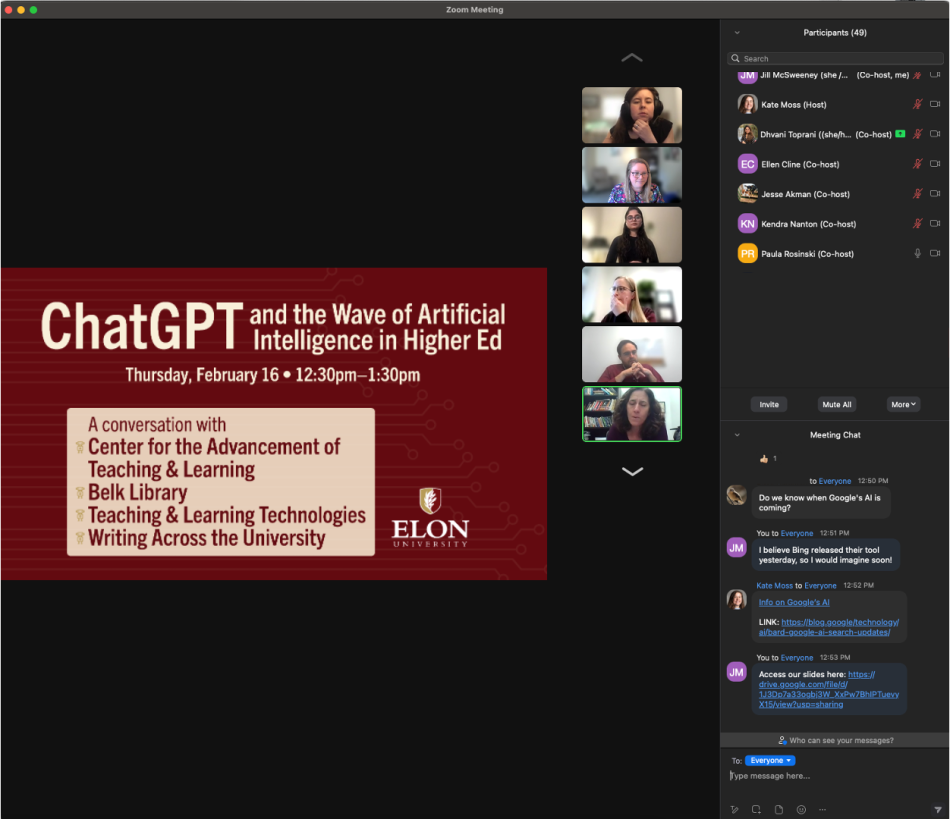The jointly-hosted discussion took place virtually on Feb. 16.
With the rapidly increasing relevance of artificial intelligence, especially language-based AI and chatbots like ChatGPT, Belk Library, The Center for the Advancement of Teaching and Learning (CATL), Teaching and Learning Technologies (TLT), and Writing Across the University teamed up on Feb. 16 to discuss AI and its implications on higher education.
With 50 faculty and staff in attendance to learn and share ideas surrounding “The Wave of Artificial Intelligence,” participants asked thought-provoking questions and offered nuanced viewpoints on how this technology might be used at Elon and across the country.

The goals of this session included:
- increasing our knowledge about AI and ChatGPT
- brainstorming opportunities for partnerships with ChatGPT during the learning process
- reflecting on strategies for how we can support students with navigating the use of AI in higher education
- building a community for further exploration of topics related to AI and ChatGPT
The session was structured so that each participating office could share information on how ChatGPT relates to their specific discipline, including potential ways to partner with the tool, and any potential issues that could arise from its use. Dhvani Toprani, assistant director of learning design and support in TLT opened the session by giving some basic information about what ChatGPT is, guiding the group through a brief overview of the ChatGPT system, looking closely at the acronym “GPT” and delving further into how the system learns. Kate Moss, Instructional Technologist in TLT then gave some important context on privacy and data security relating to ChatGPT.
Several librarians then placed ChatGPT in the context of libraries and information science. Jesse Akman, health and life sciences librarian, and Ellen Cline, engineering and physical sciences librarian, discussed how ChatGPT might impact information literacy, copyright, research support and citations. Attendees raised several perceptive questions, such as “does ChatGPT cite its sources” and “can ChatGPT be used as a research tool to direct students to other sources?” The short answer to these questions with the way ChatGPT currently operates is no, but these are important questions to think about when considering how students will use this tool and how it might be integrated into the classroom.
Research naturally segues into writing, which brought Paula Rosinski, director of Writing Across the University, into the discussion. Rosinski discussed the many ways that writing is affected by these new technologies, giving meaningful suggestions for how to work with these tools. Rosinski encouraged attendees to assess their own comfort with AI text generators and establish boundaries with students around these tools, to focus on best practices in writing instruction, and to focus on writing as a process. These focal points value student participation, help students learn, and discourage plagiarism and misuse of AI text generators.
Jill McSweeney, assistant director of CATL, and Jen Uno, Associate Director of CATL later responded to an attendee’s question regarding how we can use ChatGPT to amplify engaged learning. McSweeney gave examples of how students can debate with ChatGPT to locate flaws or gaps in its argument, and to grade an essay that was written by ChatGPT. They also discussed some ways that new technologies like ChatGPT can enhance teaching. McSweeney stressed the importance of supporting students’ academic integrity, defining ChatGPT’s presence in the classroom, and the need for contextualized assessments.
In closing, attendees were reminded that:
- AI can support and augment the learning process
- we should have clear and honest conversations with students and be transparent about AI use in the learning process
- we should continue using intentional, authentic, and student-centric assessments
Conversations around ChatGPT and AI will be ongoing as the technology advances further and becomes more prevalent. We plan to provide more space later this spring to continue these important conversations, and to continue building a community around further exploration into these topics.
For more information, check out these resources:
Bali, M. (Feb 3, 2023). On equity and trust and AI. Reflecting Allowed. [Blog].
Bjork, C. (Feb 9, 2023). ChatGPT threatens language diversity. The Conversation.
CESE NSW. (2023). A Teacher’s Prompt Guide to ChatGPT: Aligned with ‘What Works Best’.
Cummings, L. (2023). AI Syllabus Language Heuristic.
D’Agostino, S., (Jan 31, 2023). Designing Assignments in the ChatGPT Era. Inside Higher Ed.
Hardman, P. (Jan 26, 2023). Introducing: ChatGPT Edu-Mega-Prompts. The Learning Science Newsletter.
University of Michigan. (2023). What’s in the Chatterbox: Large language models, why they matter, and what we should do about them.
Van Dis. E. et al. (Feb 3, 2023). ChatGPT: five priorities for research. Nature.
Watkins, R. (2022). Update your course syllabus for chatGPT. Medium.


